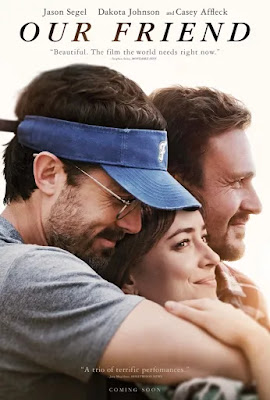Our Friend
Our Friend is an imperfect film that also manages to be one of the most honest looks at cancer, and the effect it can have on the family, not just the patient. All too often, the disease is used as a plot device, or as a reliable tearjerker method. (See just about any movie adapted from a Nicholas Sparks novel.) Here, we get a vision more grounded in reality. There are no lengthy bedside farewells, there are no moments where the survivors learn life lessons from the experience, and there is no deep meaning. It's simply an honest look at what happens when a loved one is going to be taken away well before their time. It's frustrating, angering and brutal, and that's what this movie gets.It's not surprising the film is so honest, as its source of inspiration is an essay written by Matthew Teague about the death of his wife, and the friend who helped both him and his daughters cope with the process of the illness. Here, Matt is portrayed by Casey Affleck, as a man who clearly loves his wife Nicole (Dakota Johnson) and two little girls, but sometimes has a hard time showing it. He's a journalist who is usually sent away covering stories, and it's obviously taken a toll on his family. Nicole tells him at one point she feels like a single mother sometimes, and when his oldest daughter finds out her mother is going to die, she bluntly tells him her biggest fear is that he is going to be raising her from now on, as he's never really been there for her. Still, they're a relatively happy family, and a realistic one. The daughters don't know how to react to the news that their mom only has six months or so to live, and neither does Matt. As for Nicole, she's trying her best to appear normal to friends and family, but it's obviously taking a toll.During the final year of Nicole's life, a mutual friend named Dane (Jason Segel) decides to move in to offer his services around the house, help raise the girls, and genuinely assist with any grieving or venting that needs to be done. Dane is the sort of guy who is smart and always means well, but has never gotten ahead in life. He works at a sporting goods store, and sometimes talks about becoming a stand up comedian, but doesn't really seem to know which way to go in order to get his life started. He can't help but feel like life has passed him by as he sees his friends married with families. He also hears them talking about how he hasn't changed much since his college days, and probably never will. He does have a relationship with a young woman, but when he sees how overwhelmed Matt and Nicole are with their situation, he can't turn his back on them. His plan to stay and help them out for a few weeks turns into many months, putting his own life and his relationship on hold.The character of Dane, as well as Segel's performance (the best he's ever given), are what makes Our Friend much more than your standard "disease" movie. The film never forgets the sacrifice that he is making, but at the same time, it doesn't make him into a Saint. Dane is a mess, bluntly speaking. He has little direction in his life, but he's still willing to step up for others. He's also good with the girls, and genuinely wants to be there for the entire family. He is believable, and so is the friendship that he shares with both Matt and Nicole. This is crucial, as if we don't believe this friendship, the movie falls apart. These are also not perfect people. Dane sometimes gets lost in self-pity about whether he will ever amount to anything. Matt usually holds his anger and emotions in, but he can also explode at certain times. As for Nicole, she's frustrated for what she's going through, and what it's obviously doing for everyone around her. All of these aspects of the characters are handled beautifully by Brad Ingelsby's screenplay. The movie also gets a lot of details right about the response from Nicole's friends to her disease. When she is first diagnosed, there is an outpouring of support, with tons of well-wishers dropping off food and offering help "any time she needs it". But, as the disease worsens, those friends stop dropping by and calling. They don't want to be around her in the later stages, and start finding excuses not to be around her. There are a lot of truths in this movie that really surprised me. What I was less impressed with is how the film decides to tell its story out of sequence. The movie jumps about to different time periods, with subtitles informing us that it's 13 years ago, 4 years ago, a year since the diagnosis, and such. It's not so much confusing, as it is unnecessary. A straightforward narrative would have worked just fine here, and probably could have made it an even better film, since the time-hopping storytelling never really pays off.
This poor storytelling decision still does little to diminish the power of Our Friend. It does not sermonize, nor does it ever try to make its story into anything more than what it is. These are flawed people with real emotions, so maybe it's fitting that the film itself is the same way. What it gets right above all else is making these people come across as real. I found myself identifying with them, and with what they were feeling. That's such a simple thing, and yet it's something Hollywood struggles with.












0 Comments:
Post a Comment
<< Home